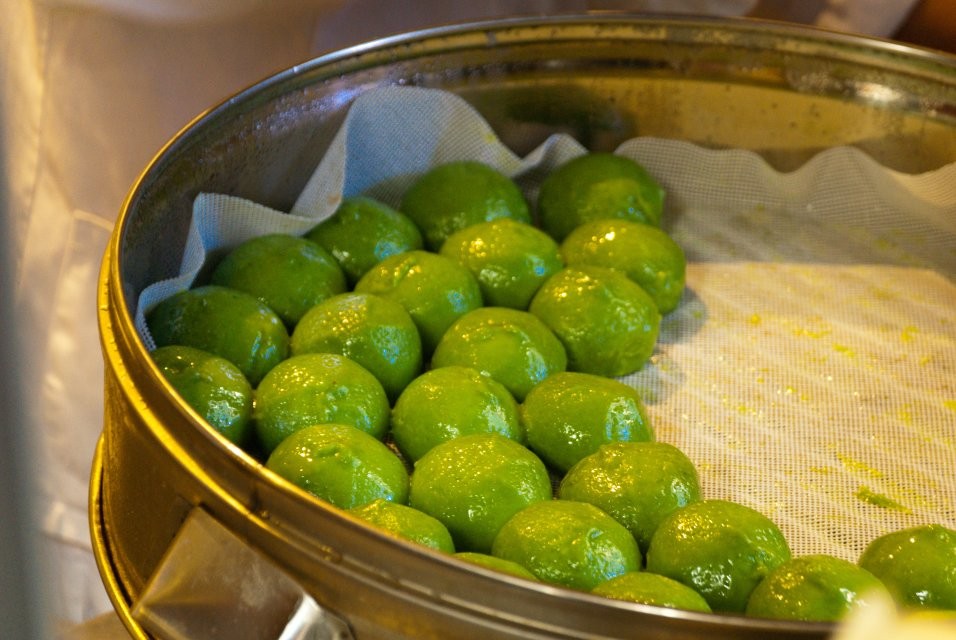IN THE MODERN DAY Qingming Festival (清明節), people in southern China and part of Southeast Asia, young and old expect to enjoy Qingtuan (青糰), a kind of green glutinous dessert with various fillings.
However, some people may not know that this delicious dessert was not originally intended for Qingming, but for another important day in ancient China – known as the Cold Food Festival (寒食節).

Although most Chinese people no longer celebrate the Cold Food Festival, it actually has a much longer history than Qingming. And there’s a sad story behind it.
DESPERATE HUNGER
In the Spring and Autumn Period (春秋時期, 770 to 481 BC), Chong’er (重耳), an exiled royal scion from Jin State (晉國), suffered from poverty and desperate hunger.
The story goes that Jie Zitui (介子推), one of his few remaining courtiers, carved a large piece of flesh from his thigh to make a meat soup to save the king from dying of starvation. Chong’er was revived, and his fortunes finally changed.
After 19 years’ travelling as an itinerant in eight States of China, Chong’er finally returned to his homeland and took the throne as Duke Wen of Jin (晉文公).
To show his appreciation for Jie’s loyalty, Chong’er prepared a high position in his court for Jie. However, Jie refused the Duke’s invitation. The ministers of the time were sycophantic, and he wanted to avoid political trouble. Instead, he took his old mother and they moved into a cave for seclusion.

Angry at the turn of events, the Duke came up with the risky notion of asking his servants to set up a fire at the entrance to the cave, thinking that the heavy smoke would force Jie to come out.
Unfortunately, the fire burned too furiously to control, and Jie and his mother died in the cave.
A HORRIBLE MISTAKE
The leader realized that he had made a horrible error and caused the death of the man who saved his life. To commemorate Jie, the grief-stricken Duke forbade his people to use fire on three special days in spring each year—and even cooking with fire was not allowed. During these days, people would only eat cold food.
Some historians believe that this event was the origin of the Cold Food Festival: the “fire ban” policy introduced during the Zhou Dynasty (周代).
Whatever the origin of the event, when ancient people ate cold rice, they believed that adding juice from green plants and vegetables could make the food healthier. In later generations, people improved the recipe of “green cold food” by mixing glutinous rice flour and wormwood juice as the outer dough, and wrapping bean paste or meat string and egg yolk as the filling.
After a few minutes of steaming, the green crystal dessert qingtuan was created. To this day, although qingtuan fillings have evolved to include fruit, chocolate and meat, the two classic flavours are still the most popular.

But why has the Cold Food Festival disappeared in modern society?
In ancient China, after the boring and gloomy Cold Food Festival, there was a cheerful day called Qingming Festival, during which people went on spring outings with their families, drank wine and wrote poems with friends.
The contrast of different atmospheres meant that people undoubtedly preferred the festive gathering. As time went by, more and more people ignored the Cold Food Festival and looked forward to Qingming. Soon the activities of the two festivals were combined, including cleaning graves, holding worship services and, of course, spending happy hours celebrating family and friends on vibrant spring days.

These customs have been handed down to modern society—and the sad part of the event is not forgotten, as people still remember the ancient texts. Writing about a Qingming festival in the 9th century AD, the late Tang Dynasty of China, the famous poet Du Mu said,
“A drizzle falls like tears on the day of mourning;
The mourner’s heart will break on its way”.
(“清明時節雨紛紛,路上行人欲斷魂”)
But now we recognized that the mournful mood is only part of the festival. After the grave-sweeping, people wipe away their tears and start a new day with happy smiles on their faces.
Image at the top from Sohu.

